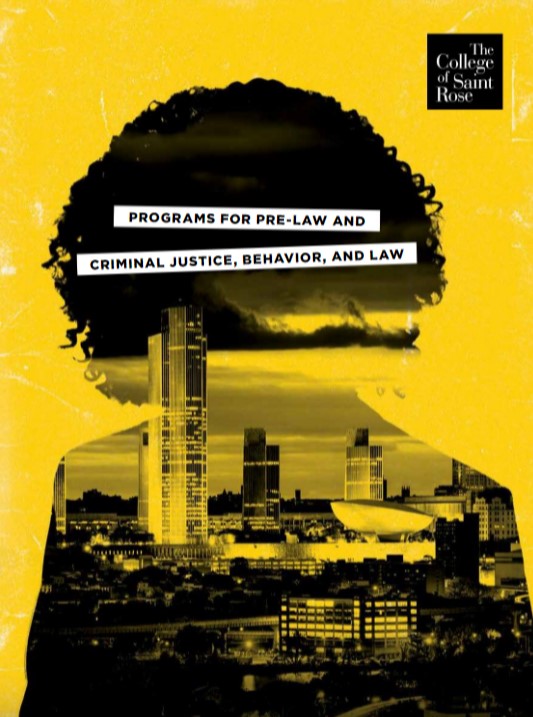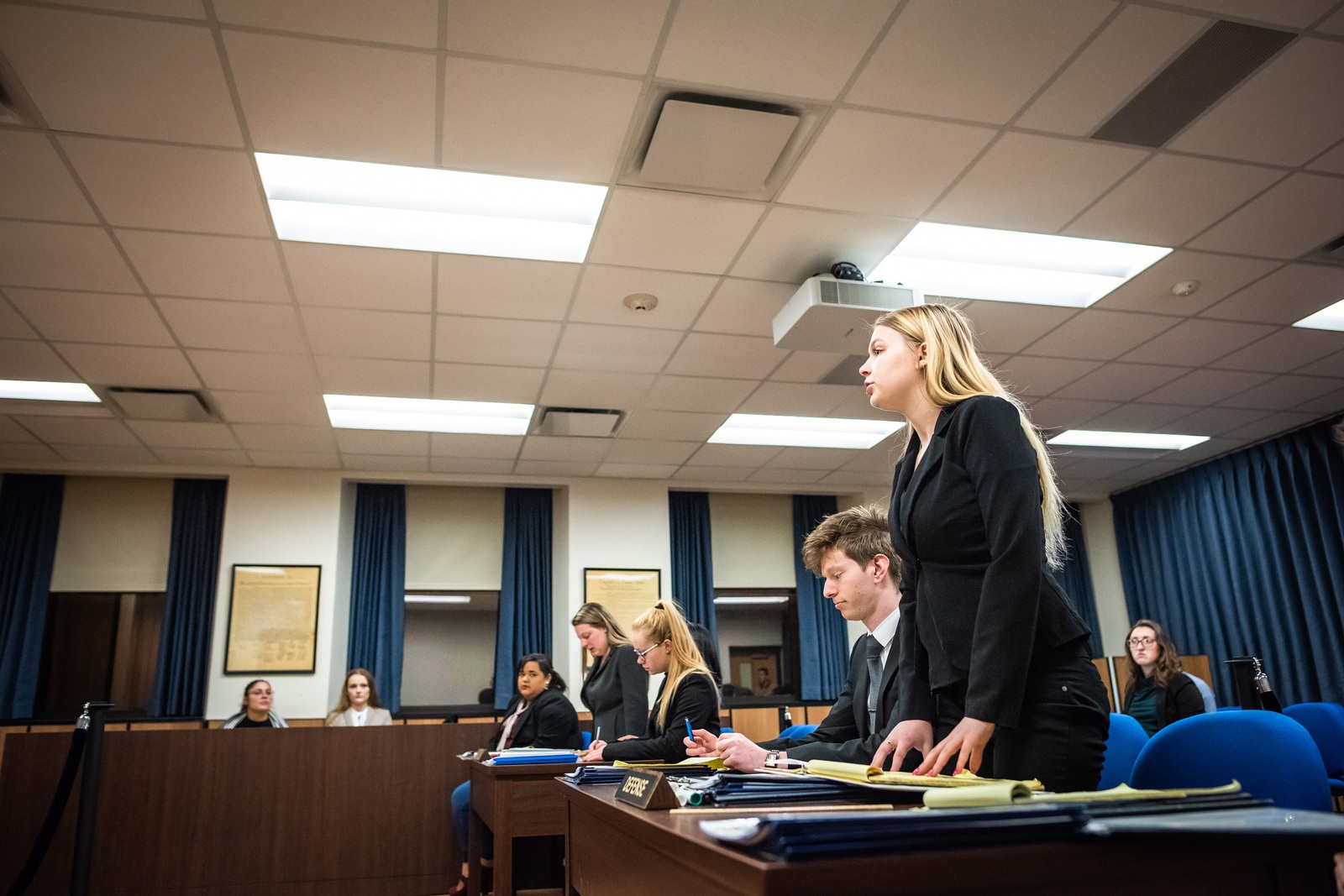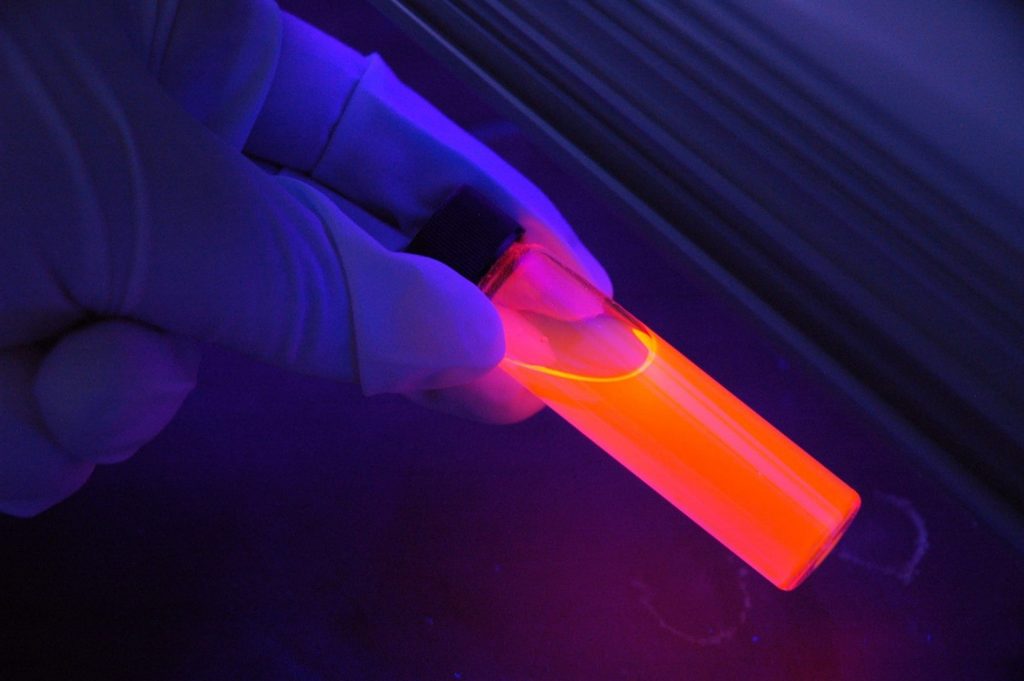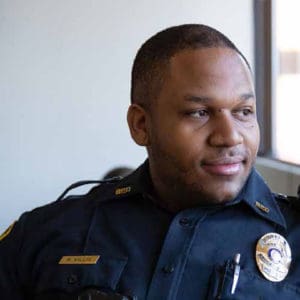Bachelor of Science Degree in Criminal Justice, Behavior & Law

Choose Saint Rose to Begin Your Career in Criminal Justice
Working in the criminal justice system requires knowledge from many disciplines. As a result, the bachelor’s in criminal justice program at The College of Saint Rose uses an interdisciplinary approach to prepare its students for a variety of criminal justice jobs in this challenging field.
Many people think of the criminal justice system as “cops, courts, and corrections” working together to capture, convict, and punish people who violate the law, but the truth is much more complex.
At Saint Rose, the BS in Criminal Justice coursework is designed to expose students to theories and ideas drawn from biology, economics, political science, philosophy, history, psychology, and sociology. This diversity helps them gain a deeper understanding of the reasons people commit crimes and how society responds.
What You Can Do with a Bachelor’s in Criminal Justice
The interdisciplinary approach to a criminal justice degree from Saint Rose is designed to prepare students for careers in law enforcement and nongovernmental organizations. It also provides the foundation for pursuing graduate degrees in public administration, criminal justice, forensic psychology, and law.
The career outlook for graduates with a criminology degree varies widely, depending on what students want to do with the degree as there is no set path.
Law enforcement officers, for instance, can have tremendous job security and virtually unmatched benefits, but they also have physically and emotionally demanding jobs. Pursuing an advanced degree in law school can be a lucrative way to use the foundational knowledge gained from earning a criminal justice degree, although the cost of law school may be prohibitive.
No matter which career path students decide to pursue, a BS in Criminal Justice can provide background knowledge in the complex forces that are at work in preventing, investigating, in addition to studying crime and criminal behavior.

Get Your Guide
Take a deep dive into our criminal justice programs. We prepare the next generation of scientists — are you ready to make your discovery?
The criminal justice program offers so many interesting courses and subjects. In my first year, I did not know exactly what career I wanted to pursue. However, after taking various classes from law and psychology to sociology and more, and having open and intellectual conversations with my professors, I was able to figure out what I wanted.
I have grown to love detective work, working to find justice for those who need it. Additionally, the Cold Case Analysis Center is such a great experience to learn from and prepare for working in the criminal justice world."

Jasmine Robles '21
Criminal justice, behavior, and law major with a concentration in criminal behavior and criminology, Cold Case Analysis Center intern
Program Highlights
You’ll learn from experienced faculty who are focused on your success, alongside bright, motivated classmates who challenge and support you.
- Our average class size is fewer than 20 students, which allows you to receive individual attention and enables you to build rewarding connections with your classmates and
professors. - A sociological perspective allows the student to understand that crime and the criminal justice system are by-products of societal issues.
- Our location in the state capital means you will find meaningful internship experiences that range from work in state agencies to local police.
- Student associations include Criminal Justice Colloquium and Alpha Phi Sigma Criminal Justice Honor Society, and host events and field trips developed from student interests.
- Speakers regularly visit campus to share their career experiences or discuss criminal justice topics with students.
- Senior seminar and advanced theory courses prepare you for graduate studies or to start your criminal justice career.
- Other programs at Saint Rose offer students ways to diversify their program with courses, such as Forensic Computing (CSC).
- Faculty-led study abroad experiences allow students to explore the field on an international level.
- Our Mock Trial Team and Cold Case Analysis Center give students hands-on experience in the field.
- Our first-year seminar helps students acclimate to Saint Rose and the major and prepares them for success.
Concentrations
Find your focus. You can narrow your studies by choosing to concentration in one of these four areas:
This concentration is for students with interests in law enforcement and homeland security as it relates to criminal justice issues such as terrorism/counter terrorism, trafficking, drugs, gangs, immigration, refugees, climate change, and national disasters.
Students who would like to pursue a career in policing, FBI, DHS, CIA, and corporate or private security should consider this concentration.
This concentration is for students with interests in careers such as law and lawyering. Students interested in law/lawyering should combine this concentration with the Legal Studies Minor.
This concentration is for students who are interested in how and why individuals/groups engage in deviance, crime, and violence, understanding how the criminal event involves the offender, and many other contributing factors.
Students who complete this concentration will be prepared to pursue graduate work or other advanced certification in criminology or criminal justice.
Curriculum and Internships
We take an interdisciplinary approach to our program, so you understand the biology, economics, political science, philosophy, history, psychology, and sociology behind why people commit crimes and how society responds.
- Students who want to prepare for graduate school and/or post-graduate work involving research can quality for the William J. Hagan Research Honors Concentration, which involves a major research project not unlike what is commonly done for a master’s thesis.
- Dive into fascinating topics with our courses: Policing in a Free Society; Criminal Profiling; Juvenile Justice; Prosecuting Crime; Sex Crimes and Paraphilia; Serial Crime; Scientific and Expert Opinion Evidence; and Drugs, Crime and Criminal Justice – just to name a few.
- We’re with you from start to finish: Criminal justice, behavior, and law students take a first- year seminar that prepares them for the transition to college. Then, toward the end of their careers, they take a career preparation course (CJS 399) that provides career education and training in fields related to criminal justice.
- Our faculty have connections throughout the community, opening doors for students when it comes to finding internships.

Located in the heart of the New York State capital
Our location in New York State’s capital is a playground for students who want to explore careers in government, law enforcement, nonprofit work, and more.
- Albany County Sheriff’s Department
- Albany Police Department
- Albany Department of Probation
- Albany County Crime Victim and Sexual Violence Center
- Citizen’s Police Academy
- Lasalle School
- New York State Assembly
- New York State Division of Criminal Justice
- New York State Office of Forensic Services
- New York State Office of the Inspector General
- New York state Office of Mental Health
- New York State Troopers
- Office of Court Administration
- St. Anne Institute
- U.S. Department of Homeland Security
- U.S. Secret Service
- New York State Department of Corrections and Community Supervision
Cold Case Analysis Center Internships
Selected students in the Criminal Justice, Behavior and Law major have the opportunity to intern with our expert faculty advisors and work on true cold cases in our Cold Case Analysis Center.
Cold Case Analysis Center
Upstate Unsolved Podcast
A WGY and iHeartRadio investigative podcast going beyond the headlines of Upstate NY’s unsolved crimes, in partnership with The Cold Case Analysis Center at The College of Saint Rose.
Upstate Unsolved Podcast
Loretta A. Preska Mock Trial Courtroom
In our authentic mock courtroom, our Mock Trial Team prepares for The American Mock Trial Association’s regional and national tournaments.
Meet Our Criminal Justice, Behavior, and Law Faculty
Our faculty are great scholars, but your success is their top priority. Unlike large research institutions, Saint Rose is a place where professors invest in their students and put their energy into teaching, making for compelling classes and great learning outcomes.
I am a behavioral neuroscientist and teach a variety of courses including Biopsychology, Psychopharmacology, Neuropsychology, Learning & Memory, and Sensation & Perception. One of my favorite courses to teach is our First-Year Seminar because I get the opportunity to work closely with a small group of eager new majors who are just starting their college careers. My students and I conduct research on the neurobiological processes associated with learning and memory. In particular, we are interested in the neuroanatomical substrates of learning and memory and the factors that modulate memory formation, particularly stress and arousal.
I specialize in statistics and methodology, as well as criminal justice actors, policy and practice. I also work in the juvenile justice field, so I have a lot of expertise in that area. I chose to teach criminal justice at Saint Rose because I think it is important to help people looking to enter the field understand the complexity and nuance of the system. I also remember the impact that my criminal justice professor had on me and my career, and I would like to help students find the trajectory that fits for them. I am always trying to make my class as relevant as possible, and I love when students use current events or their own lives to help aid in discussion and understanding.
I am an attorney, former law enforcement executive, and a retired military officer. I have served in various roles throughout the US and internationally, but my favorite has been teaching and guiding undergraduate students. My teaching interests include corrections and re-entry; artificial intelligence; surveillance and monitoring; intelligence writing and briefing; homeland security; ethics and leadership; and terrorism and counterterrorism. My teaching goals are to provide interesting and relevant information to students, every day and in every class, and to help students learn from each other, think on their own, solve challenging issues, and break complex matters down into manageable steps.
In addition to serving as dean of the School of Mathematics and Sciences, my teaching interests include artificial intelligence, cybersecurity, data communications and networking, bioinformatics, and discrete mathematics. I was proud to have started the Insider Threat cybersecurity course at Saint Rose, which helps students to understand cybersecurity through a wholistic perspective – looking at the psychology and criminology of why people commit cybercrimes and how the structure of businesses can either protect them from cyber threats or make them more vulnerable. The cybersecurity major at Saint Rose was later started based on this approach.
I am a behavioral neuroscientist and teach a variety of courses including Biopsychology, Psychopharmacology, Neuropsychology, Learning & Memory, and Sensation & Perception. One of my favorite courses to teach is our First-Year Seminar because I get the opportunity to work closely with a small group of eager new majors who are just starting their college careers. My students and I conduct research on the neurobiological processes associated with learning and memory. In particular, we are interested in the neuroanatomical substrates of learning and memory and the factors that modulate memory formation, particularly stress and arousal.
I specialize in statistics and methodology, as well as criminal justice actors, policy and practice. I also work in the juvenile justice field, so I have a lot of expertise in that area. I chose to teach criminal justice at Saint Rose because I think it is important to help people looking to enter the field understand the complexity and nuance of the system. I also remember the impact that my criminal justice professor had on me and my career, and I would like to help students find the trajectory that fits for them. I am always trying to make my class as relevant as possible, and I love when students use current events or their own lives to help aid in discussion and understanding.
I am an attorney, former law enforcement executive, and a retired military officer. I have served in various roles throughout the US and internationally, but my favorite has been teaching and guiding undergraduate students. My teaching interests include corrections and re-entry; artificial intelligence; surveillance and monitoring; intelligence writing and briefing; homeland security; ethics and leadership; and terrorism and counterterrorism. My teaching goals are to provide interesting and relevant information to students, every day and in every class, and to help students learn from each other, think on their own, solve challenging issues, and break complex matters down into manageable steps.
In addition to serving as dean of the School of Mathematics and Sciences, my teaching interests include artificial intelligence, cybersecurity, data communications and networking, bioinformatics, and discrete mathematics. I was proud to have started the Insider Threat cybersecurity course at Saint Rose, which helps students to understand cybersecurity through a wholistic perspective – looking at the psychology and criminology of why people commit cybercrimes and how the structure of businesses can either protect them from cyber threats or make them more vulnerable. The cybersecurity major at Saint Rose was later started based on this approach.
Career Outcomes
The Bureau of Labor Statistics projects that job opportunities in criminal justice fields will grow faster than average over the next 10 years:
Addiction and Behavioral Counselors: (much faster than average)
Forensic Science Technicians: (much faster than average)
Police and Detectives (faster than average)
Lawyers: (average growth)

Top Jobs You Can Get with a Bachelor’s in Criminal Justice
A Bachelor of Science degree in criminal justice from The College of Saint Rose gives students a versatile perspective that applies to many roles within the field. Graduates find fulfilling careers in criminal investigation, intelligence, nonprofits, consulting, law, and law enforcement. Obtaining a degree in criminal justice allows graduates the opportunity to explore an expansive career path, giving them the chance to find their passion.
Once I got to Saint Rose, I had a different attitude. I wanted to own what I did and share what I learned in the military.
When I got accepted into the FBI, everything paid off. I got my master’s and my dream job.”

Vince Soldani ’14 G’16
Accounting analyst, Criminal Justice Information Services, Federal Bureau of Investigation (FBI), Clarksburg, West Virginia
The Saint Rose criminal justice program helped me focus on my interest in criminal law and prosecution.
Because of the opportunities, such as the Mock Trial program and taking classes with professors in the field, I felt confident in pursuing law school and my now career as a prosecutor."

Marissa (Schatzel) Olsen ’14, JD
Assistant District Attorney, Albany County District Attorney’s Office
At Saint Rose, I gained excellent communication skills, which helps me to present my case in court of the district attorneys.
I also learned to talk to people with compassion, which really helps in my work now.”

Brian Xavier Willis '15
Police officer, Brookhaven Police Department in Brookhaven, Georgia
Contact Us Today
Of course, if you have any questions, please reach out. We’re here to help.

